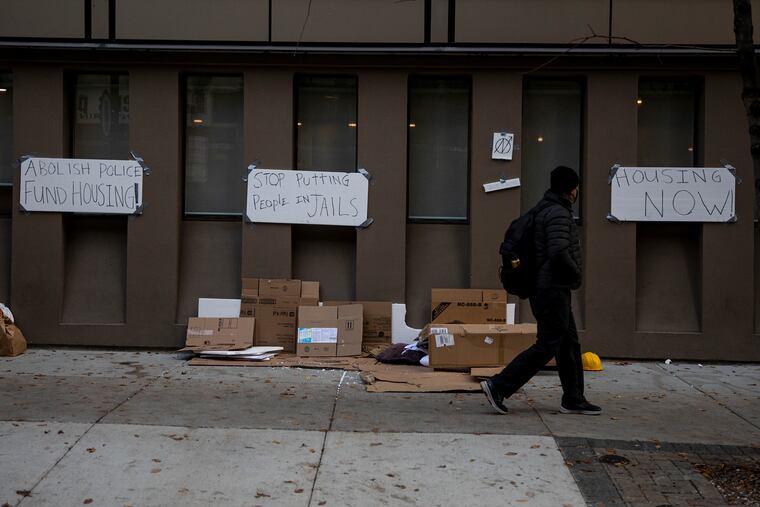As Biden offers more emergency funds, activists say Philly should reopen COVID hotels for the homeless
Activists say that now, the city should be re-opening COVID hotels and asking for full reimbursements from the federal government.

For several months at the start of the pandemic, Stacie Miller lived in a Holiday Inn in Center City, a “COVID hotel” for people vulnerable to the virus but with nowhere to safely quarantine.
That arrangement ended when city officials said federal funding had dried up and the hotels were too costly a way to prevent COVID-19 among homeless Philadelphians.
So Miller, who has chronic lung conditions, and other hotel residents decamped to a former halfway house in North Philadelphia with shared bathrooms and dining facilities that make isolation impossible.
Now Miller is back at the Holiday Inn — because she contracted COVID-19. She believes she was infected in the halfway house’s communal dining space. Now, she again qualifies to be in the hotel that once was intended to help prevent the disease.
“I should have never been put in a shelter,” said Miller, 59.
Miller’s concerns echo those of housing advocates, who say the city should be reopening COVID hotels to prevent illness, especially since the Biden administration has signaled it will reimburse cities for such accommodations at a higher rate than the Trump administration did.
City officials counter that they are unsure what the federal government might reimburse and are reluctant to spend money they might not get back. Pointing to cities including Los Angeles, San Francisco, Baltimore, and Seattle that have kept such hotels open, local advocates want Philadelphia to seek funding to reopen the hotels from the Federal Emergency Management Agency.
“If FEMA screws you over, work with your community and other cities,” said Paul Boden, a longtime national housing activist and the president of the San Francisco-based Western Regional Advocacy Project. “But don’t not respond to a life-and-death situation for members of your community because they’re poor and you want better clarity from the federal government.”
Under the Trump administration, FEMA offered to reimburse cities’ costs related to COVID hotels at a 75% rate. The Biden administration announced late last month that FEMA will now refund 100% of those costs, dating back to January 2020.
The FEMA funds don’t cover all the costs associated with running COVID hotels in some cities; for example, Seattle had to find other ways to cover behavioral health treatment for some residents of the hotels. And the money can take some time to make its way to municipalities.
The Seattle Times reported this week that King County, which includes Seattle, spent $60 million opening hotels and quarantine sites for the homeless in the first three months of the pandemic and has received $21 million in refunds from the federal government.
But activists in Philadelphia say city officials here have barely made an effort to recoup what costs they can through FEMA. The city mostly used last year’s COVID-19 relief act to fund the hotels and are working on their first application for FEMA refunds.
“It’s difficult to ascertain what would be reimbursed,” said Eva Gladstein, the city’s deputy managing director of health and human services. “We’re trying to maximize every federal resource.” Liz Hersh, director of Philadelphia’s Office of Homeless Services, said the city is “very, very engaged on the federal level on what new funding is available.”
Activists say that now, the city should be reopening COVID hotels and asking for full reimbursements from the federal government. Other cities like Los Angeles have announced plans to extend their hotel programs given the new reimbursement rules and are working with FEMA to determine if they can receive the funding up front instead of waiting for a reimbursement, the Los Angeles Times reported.
Philadelphia officials have no plans to do so, Gladstein said. She said it would be “disruptive” for residents to be moved back from their current accommodations to the hotels.
“It seems to me like there’s no good reason not to be doing this,” said Wiley Cunningham, a member of Philadelphia Housing Action and one of a group of housing activists who have slammed the city for its closure of the COVID hotels in December. “We need to lean into this and lower the community spread. And it’s a bunch of federal money that comes into the local economy.”
Former residents of the COVID hotels say the cheaper accommodations they were moved to in late December were a significant step down from the hotels where they’d had their own rooms and were able to more effectively isolate from others. The city has promised each resident of the hotels permanent housing; 110 people have moved into long-term housing so far, and about 70 are left in the shelter accommodations.
Darryl Hawkins said he had spent a few months at a COVID hotel in Center City before he and several other residents were driven to another facility at 21st and Tioga Streets. He said he wasn’t told where he was being taken until the van arrived on Tioga Street.
Hawkins has cancer and respiratory issues. At the hotel, he was able to isolate from others; on Tioga Street, he had to share a bathroom and dining facilities with others.
“It was just a lot of people in the house,” he said. “I was never supposed to go to a shelter. I was never supposed to be around a lot of people.”
He became even more worried when a staffer at the facility contracted COVID-19. He ended up leaving twice, sleeping in a van under a bridge, until he was persuaded to return.
Last week, he moved into a permanent apartment. He was grateful, he said, to be on his own again.
The Philadelphia Inquirer is one of more than 20 news organizations producing Broke in Philly, a collaborative reporting project on solutions to poverty and the city’s push toward economic justice. See all of our reporting at brokeinphilly.org.